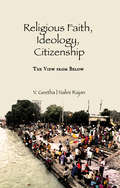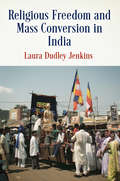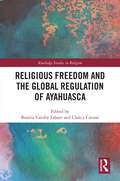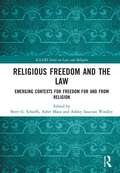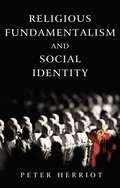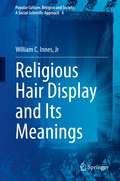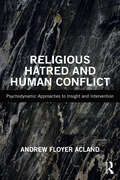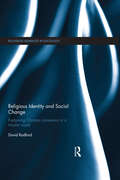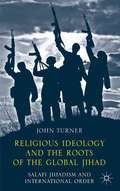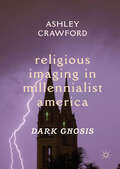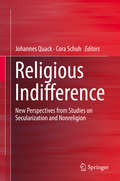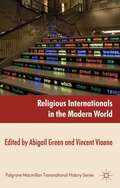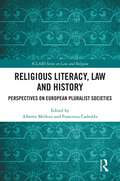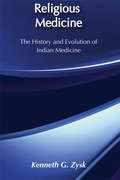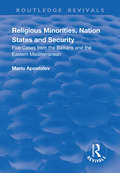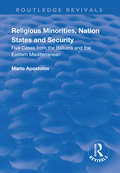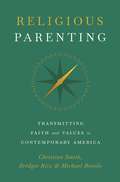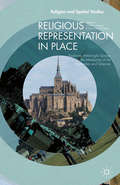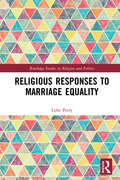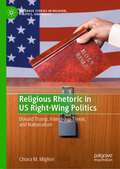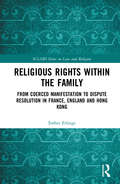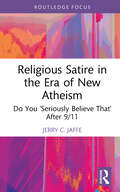- Table View
- List View
Religious Faith, Ideology, Citizenship: The View from Below
by V. Geetha Nalini RajanThis book looks at the triadic relations between faith, the state and political actors, and the ideas that move them. It comprises a set of essays on diverse histories and ideas, ranging from Gandhian civic action to radical free thought in colonial India, from liberation theologies, that take their cue from specific and lived experiences of oppression and humiliation, to the universalism promised by an expansive Islam. Deploying gender and caste as the central analytical categories, these essays suggest that equality and justice rest on the strength and vitality of the exchanges between the worlds of the civic, the religious and the state, and not on their strict separation. Going beyond time-honoured dualities — between the secular and the communal (especially in the Indian context), or the secular and the pre-modern — the book joins the lively debates on secularism that have emerged in the 21st century in West, South and South-east Asia.
Religious Freedom and Mass Conversion in India (Pennsylvania Studies in Human Rights)
by Laura JenkinsHinduism is the largest religion in India, encompassing roughly 80 percent of the population, while 14 percent of the population practices Islam and the remaining 6 percent adheres to other religions. <P><P>The right to "freely profess, practice, and propagate religion" in India's constitution is one of the most comprehensive articulations of the right to religious freedom. Yet from the late colonial era to the present, mass conversions to minority religions have inflamed majority-minority relations in India and complicated the exercise of this right. <P><P>In Religious Freedom and Mass Conversion in India, Laura Dudley Jenkins examines three mass conversion movements in India: among Christians in the 1930s, Dalit Buddhists in the 1950s, and Mizo Jews in the 2000s. Critics of these movements claimed mass converts were victims of overzealous proselytizers promising material benefits, but defenders insisted the converts were individuals choosing to convert for spiritual reasons. >{?>{?Jenkins traces the origins of these opposing arguments to the 1930s and 1940s, when emerging human rights frameworks and early social scientific studies of religion posited an ideal convert: an individual making a purely spiritual choice. However, she observes that India's mass conversions did not adhere to this model and therefore sparked scrutiny of mass converts' individual agency and spiritual sincerity. <P><P>Jenkins demonstrates that the preoccupation with converts' agency and sincerity has resulted in significant challenges to religious freedom. One is the proliferation of legislation limiting induced conversions. Another is the restriction of affirmative action rights of low caste people who choose to practice Islam or Christianity. Last, incendiary rumors are intentionally spread of women being converted to Islam via seduction. <P><P>Religious Freedom and Mass Conversion in India illuminates the ways in which these tactics immobilize potential converts, reinforce damaging assumptions about women, lower castes, and religious minorities, and continue to restrict religious freedom in India today.
Religious Freedom and the Global Regulation of Ayahuasca (Routledge Studies in Religion)
by Beatriz Caiuby Labate Clancy CavnarThis book offers a comprehensive view of the legal, political, and ethical challenges related to the global regulation of ayahuasca, bringing together an international and interdisciplinary group of scholars. Ayahuasca is a psychoactive brew containing DMT, which is a Schedule I substance under the United Nations Convention on Psychotropic Substances, and the legality of its ritual use has been interpreted differently throughout the world. The chapters in this volume reflect on the complex implications of the international expansion of ayahuasca, from health, spirituality, and human rights impacts on individuals, to legal and policy impacts on national governments. While freedom of religion is generally protected, this protection depends on the recognition of a religion’s legitimacy, and whether particular practices may be deemed a threat to public health, safety or morality. Through acomparative analysis of different contexts in North America, South America and Europe in which ayahuasca is consumed, the book investigates the conceptual, philosophical, and legal distinctions among the fields of shamanism, religion, and medicine. It will be particularly relevant to scholars with an interest in Indigenous religion and in religion and law.
Religious Freedom and the Law: Emerging Contexts for Freedom for and from Religion (ICLARS Series on Law and Religion)
by Brett G. Scharffs Asher Maoz Ashley Isaacson WoolleyThis volume presents a timely analysis of some of the current controversies relating to freedom for religion and freedom from religion that have dominated headlines worldwide. The collection trains the lens closely on select issues and contexts to provide detailed snapshots of the ways in which freedom for and from religion are conceptualized, protected, neglected, and negotiated in diverse situations and locations. A broad range of issues including migration, education, the public space, prisons and healthcare are discussed drawing examples from Europe, the US, Asia, Africa and South America. Including contributions from leading experts in the field, the book will be essential reading for researchers and policy-makers interested in Law and Religion.
Religious Fundamentalism and Social Identity
by Peter HerriotThe attacks on the World Trade Centre and the Pentagon in the United States of September 11th, 2001 brought the phenomenon of religious fundamentalism to the world's attention.Sociological research has clearly demonstrated that fundamentalists are primarily reacting against modernity, and believe that they are fighting for the very survival of their faith against the secular enemy. But we understand very little about how and why people join fundamentalist movements and embrace a set of beliefs, values and norms of behaviour which are counter-cultural. This is essentially a question for social psychology, since it involves both social relations and individual selves. Drawing on a broad theoretical perspective, social identity theory, Peter Herriot addresses two key questions: why do fundamentalists identify themselves as an in-group fighting against various out-groups? And how do the psychological needs for self-esteem and meaning motivate them? Case studies of Mohammed Atta, the leader of the 9/11 hijackers, and of the current controversy in the Anglican Church about gay priests and bishops, demonstrate how fruitfully this theory can be applied to fundamentalist conflicts. It also offers psychologically sensible ways of managing such conflicts, rather than treating fundamentalists as an enemy to be defeated. Religious Fundamentalism and Social Identity is unique in applying social identity theory to fundamentalism, and rare in that it provides psychological (in addition to sociological) analyses of the phenomenon. It is a valuable resource for courses in social psychology which seek to demonstrate the applicability of social psychological theory to the real world.
Religious Hair Display and Its Meanings (Popular Culture, Religion and Society. A Social-Scientific Approach #4)
by William C. Innes, JrThis book explores the fascinating world of religious hair observances within six religious traditions that account for 77% of the world’s adherents: Judaism, Christianity, Islam, Hinduism, Buddhism, and Sikhism. Symbolic use of hair has been, and remains, prevalent in all six and carries significant amounts of religious and social meaning. Hair is a unique body substance. It can be shaped and colored, removed from us without pain but still retain an individual’s essence, signal our age, sex, and sexual maturity, and much, much more. The book’s approach is to situate each practice within its tradition. That requires a study of its foundational leaders and their teachings, sacred texts (where they mention hair), its rites and rituals, ideas of religious power and subsequent historical development. Contemporary practitioners are interviewed for their motivations. Even more insight can be gleaned by searching beyond an overt religious purpose. Social scientists from anthropology, sociology, psychology, and related fields bring their research to deliver added perceptions.The author reveals how hair practices are created from ancient psychological and cultural impulses, become modified by time, culture and religious intent, and are adopted by adherents for reasons ranging from personal religious expression to group identity. This book is written for the interested observer of our increasingly diverse society and for the student of comparative religion and sociology. It will change forever how you see hair.
Religious Hatred and Human Conflict: Psychodynamic Approaches to Insight and Intervention
by Andrew Floyer AclandReligious Hatred and Human Conflict focuses the lens of psychodynamic psychology on a phenomenon that often confounds conventional thinking – the intensity of conflict with religious or quasi-religious dimensions. The book highlights six dimensions of religion: identity, doctrine and practice, emotion and experience, mythology, sacred values and power and control, exploring how these can give rise to religious hatred and lead to marginalisation, persecution and even genocide. It also explores reasons for the evolution of religion and religious hatred, and their relationship with human behaviour through contemporary issues such as fundamentalism, martyrdom, clerical narcissism and apocalyptic belief. Acland examines how religious hatred and conflict may be transcended by facilitating processes of dialogue and diapraxis which enable a systematic understanding of prejudices and projections. Last, it offers practical methods and strategies for helping individuals and communities grow beyond the constraints of religious hatred, treating religious hatred as a psycho-spiritual problem that requires self-understanding. Identifying the implications for professionals in conflict resolution and mediation, politicians, community leaders, diplomats and anyone working to prevent or reduce conflict where religious belief is a factor, this book sets out how those tasked with intervening can respond to the challenges involved. It will also be highly relevant reading for students and researchers of psychology and religious studies.
Religious Identity and Social Change: Explaining Christian conversion in a Muslim world (Routledge Advances in Sociology)
by David RadfordReligious Identity and Social Change offers a macro and micro analysis of the dynamics of rapid social and religious change occurring within the Muslim world. Drawing on rich ethnographic and quantitative research in Kyrgyzstan, Central Asia, David Radford provides theoretical insight into the nature of religious and social change and ethnic identity transformation exploring significant questions concerning why people convert and what happens when they do so. A crisis of identity occurs when religious conversion takes place, especially from one major religious tradition (Islam) to another (Christianity); and where religious identity is intimately connected to ethnic and national identity. Radford argues for the importance of recognising the socially constructed nature of identity involving the dynamic interplay between human agency, culture and social networks. Kyrgyz Christians have been active agents in bringing religious and identity transformation building upon the contextual parameters in which they are situated.
Religious Ideology and the Roots of the Global Jihad: Salafi Jihadism and International Order
by John A. TurnerThe events of 9/11 prompted questions as to the origins, nature and purpose of international jihadist organisations. In particular, why had they chosen to target the US and the West in general? Turner's book provides a unique, holistic insight into these debates, taking into account historical perceptions and ideology as key factors.
Religious Imaging in Millennialist America: Dark Gnosis
by Ashley CrawfordAshley Crawford investigates how such figures as Ben Marcus, Matthew Barney, and David Lynch—among other artists, novelists, and film directors—utilize religious themes and images via Christianity, Judaism, and Mormonism to form essentially mutated variations of mainstream belief systems. He seeks to determine what drives contemporary artists to deliver implicitly religious imagery within a ‘secular’ context. Particularly, how religious heritage and language, and the mutations within those, have impacted American culture to partake in an aesthetic of apocalyptism that underwrites it.
Religious Indifference
by Johannes Quack Cora SchuhThis book provides a conceptually and empirically rich introduction to religious indifference on the basis of original anthropological, historical and sociological research. Religious indifference is a central category for understanding contemporary societies, and a controversial one. For some scholars, a growing religious indifference indicates a dramatic decline in religiosity and epitomizes the endpoint of secularization processes. Others view it as an indicator of moral apathy and philosophical nihilism, whilst yet others see it as paving the way for new forms of political tolerance and solidarity. This volume describes and analyses the symbolic power of religious indifference and the conceptual contestations surrounding it. Detailed case studies cover anthropological and qualitative data from the UK, Germany, Estonia, the USA, Canada, and India analyse large quantitative data sets, and provide philosophical-literary inquiries into the phenomenon. They highlight how, for different actors and agendas, religious indifference can constitute an objective or a challenge. Pursuing a relational approach to non-religion, the book conceptualizes religious indifference in its interrelatedness with religion as well as more avowed forms of non-religion.
Religious Internationals in the Modern World
by Abigail Green Vincent ViaeneTracing the emergence of 'Religious Internationals' as a distinctive new phenomenon in world history, this book transforms our understanding of the role of religion in our modern world. Through in-depth studies comparing the experiences of Buddhists, Christians, Hindus, Jews and Muslims, leading experts shed new light on 'global civil society'.
Religious Literacy, Law and History: Perspectives on European Pluralist Societies (ICLARS Series on Law and Religion)
by Alberto Melloni Francesca CadedduThe book profiles some of the macro and micro factors that have impact on European religious literacy. It seeks to understand religious illiteracy and its effects on the social and political milieu through the framing of the historical, institutional, religious, social, juridical and educational conditions within which it arises. Divided into four parts, in the first one, One literacy, more literacies?, the book defines the basic concepts underpinning the question of religious illiteracy in Europe. Part II, Understanding illiteracies, debating disciplines?, highlights the theological, philosophical, historical and political roots of the phenomenon, looking at the main nodes that are both the reasons religious illiteracy is widespread and the starting points for literacy strategies. Part III, Building literacy, shaping alphabets, examines the mix of knowledge and competences acquired about religion and from religion at school as well as through the media, with a critical perspective on what could be done both in the schools and for the improvement of journalists’ religious literacy. Part IV, Views and experiences, presents the reader with the opportunity to learn from three different case studies: religious literacy in the media, religious illiteracy and European Islam, and a Jewish approach to religious literacy. Building on existing literature, the volume takes a scientific approach which is enriched by interdisciplinary and transnational perspectives, and deep entrenchment in historical methodology.
Religious Medicine: History and Evolution of Indian Medicine
by Kenneth G. ZyskThis book outlines the history and development of the Indian healing arts from Vedic medicine to classical ayurveda. It elucidates a healing tradition based on magico-religious beliefs and practices.
Religious Minorities, Nation States and Security: Five Cases from the Balkans and the Eastern Mediterranean (Routledge Revivals Ser.)
by Mario ApostolovThis title was first published in 2001. Why, in this contemporary secular age, does violent conflict among confessional communities still occur? Covering several key conflicts of recent years in one of the most dynamic areas of the world, the Eastern Mediterranean and the Balkans, Mario Apostolov uses both interpretative and comparative analysis to answer this question. His versatile approach makes for an engaging account that makes an important contribution to the current debate surrounding such conflicts.The author focuses on five case studies taken from the traditional zone of contact between Christianity and Islam:- The Copts- The Palestinian Christians- The Lebanese communities- The Pomaks- The communities of Bosnia-HerzegovinaThe book examines the relationship between these issues and communal mobilisation, the collective use of violence and the problems of international security. An informative study for students, academics, policy makers and personnel in international organizations with an interest in communal conflict and security.
Religious Minorities, Nation States and Security: Five Cases from the Balkans and the Eastern Mediterranean (Routledge Revivals)
by Mario ApostolovThis title was first published in 2001. Why, in this contemporary secular age, does violent conflict among confessional communities still occur? Covering several key conflicts of recent years in one of the most dynamic areas of the world, the Eastern Mediterranean and the Balkans, Mario Apostolov uses both interpretative and comparative analysis to answer this question. His versatile approach makes for an engaging account that makes an important contribution to the current debate surrounding such conflicts.The author focuses on five case studies taken from the traditional zone of contact between Christianity and Islam:- The Copts- The Palestinian Christians- The Lebanese communities- The Pomaks- The communities of Bosnia-HerzegovinaThe book examines the relationship between these issues and communal mobilisation, the collective use of violence and the problems of international security. An informative study for students, academics, policy makers and personnel in international organizations with an interest in communal conflict and security.
Religious Networks in the Roman Empire
by Anna CollarThe first three centuries AD saw the spread of new religious ideas through the Roman Empire, crossing a vast and diverse geographical, social and cultural space. In this innovative study, Anna Collar explores both how this happened and why. Drawing on research in the sociology and anthropology of religion, physics and computer science, Collar explores the relationship between social networks and religious transmission to explore why some religious movements succeed, while others, seemingly equally successful at a certain time, ultimately fail. Using extensive epigraphic data, Collar provides new interpretations of the diffusion of ideas across the social networks of the Jewish Diaspora and the cults of Jupiter Dolichenus and Theos Hypsistos, and in turn offers important reappraisals of the spread of religious innovations in the Roman Empire. This study will be a valuable resource for students and scholars of ancient history, archaeology, ancient religion and network theory.
Religious Parenting: Transmitting Faith and Values in Contemporary America
by Christian SmithHow parents approach the task of passing on religious faith and practice to their childrenHow do American parents pass their religion on to their children? At a time of overall decline of traditional religion and an increased interest in personal “spirituality,” Religious Parenting investigates the ways that parents transmit religious beliefs, values, and practices to their kids. We know that parents are the most important influence on their children’s religious lives, yet parents have been virtually ignored in previous work on religious socialization. Renowned religion scholar Christian Smith and his collaborators Bridget Ritz and Michael Rotolo explore American parents’ strategies, experiences, beliefs, and anxieties regarding religious transmission through hundreds of in-depth interviews that span religious traditions, social classes, and family types all around the country.Throughout we hear the voices of evangelical, Catholic, Mormon, mainline and black Protestant, Jewish, Muslim, Hindu, and Buddhist parents and discover that, despite massive diversity, American parents share a nearly identical approach to socializing their children religiously. For almost all, religion is important for the foundation it provides for becoming one’s best self on life’s difficult journey. Religion is primarily a resource for navigating the challenges of this life, not preparing for an afterlife. Parents view it as their job, not religious professionals’, to ground their children in life-enhancing religious values that provide resilience, morality, and a sense of purpose. Challenging longstanding sociological and anthropological assumptions about culture, the authors demonstrate that parents of highly dissimilar backgrounds share the same “cultural models” when passing on religion to their children.Taking an extensive look into questions of religious practice and childrearing, Religious Parenting uncovers parents’ real-life challenges while breaking innovative theoretical ground.
Religious Pluralism and Values in the Public Sphere
by Lenn E. GoodmanHow can we, as people and communities with different religions and cultures, live together with integrity? Does tolerance require us to deny our deep differences or give up all claims to truth, to trade our received traditions for skepticism or relativism? Cultural philosopher Lenn E. Goodman argues that we can respect one another and learn from one another's ways without either sharing them or relinquishing our own. He argues that our commitments to our own ideals and norms need not mean dogmatism or intolerance. In this study, Goodman offers a trenchant critique of John Rawls's pervasive claim that religious and metaphysical voices must be silenced in the core political deliberations of a democracy. Inquiry, dialogue, and open debate remain the safeguards of public and personal sanity, and any of us, Goodman illustrates, can learn from one another's traditions and explorations without abandoning our own.
Religious Radicalization and Securitization in Canada and Beyond
by Paul Bramadat Lorne DawsonAfter the terrorist attacks of 9/11, those in London and Madrid, and the arrest of the "Toronto 18," Canadians have changed how they think about terrorism and security. As governments respond to the potential threat of homegrown radicalism, many observers have become concerned about the impact of those security measures on the minority groups whose lives are "securitized."In Religious Radicalization and Securitization in Canada and Beyond, Paul Bramadat and Lorne Dawson bring together contributors from a wide range of academic disciplines to examine the challenges created by both religious radicalism and the state's and society's response to it. This collection takes a critical look at what is known about religious radicalization, how minorities are affected by radicalization from within and securitization from without, and how the public, media, and government are attempting to cope with the dangers of both radicalization and securitization.Religious Radicalization and Securitization in Canada and Beyond is an ideal guide to the ongoing debates on how best to respond to radicalization without sacrificing the commitments to multiculturalism and social justice that many Canadians hold dear.
Religious Representation in Place: Exploring Meaningful Spaces at the Intersection of the Humanities and Sciences (Religion and Spatial Studies)
by Mark K. George Daria Pezzoli-OlgiatiReligious Representation in Place brings together an interdisciplinary group of scholars from the Humanities and Sciences to broaden the understanding of how religious symbols and spatial studies interact. The essays consider the relevance of religion in the experience of space, a fundamental dimension of culture and human life.
Religious Responses to Marriage Equality (Routledge Studies in Religion and Politics)
by Luke E PerryThe Supreme Court ruling in Obergefell v. Hodges (2015) ended a 20-year political battle over same-sex marriage in the USA. The ruling in favor of a constitutional right for gays and lesbians to marry reflected growing social acceptance and political rights for gays and lesbians. At the same time, America remains a deeply religious country and many religious organizations have long opposed same-sex marriage. How do religious organizations interpret, process, and respond to shifting attitudes and public policy toward the LGBT community? Examining how religious groups in America have responded theologically and politically to the legalization of same-sex marriage, the book provides case studies from across the American religious spectrum to explore how each group understands same-sex marriage and has reacted theologically, socially, and politically to its new standing as a constitutional right. Each case study focuses on formal statements made by church leaders, incorporates original data gathered from interviews with regional and local religious authorities, and analyzes existing polling data of adherents at large. Offering a comprehensive examination of religious responses to marriage equality in the USA, this book will interest scholars and students in the fields of religion and politics, civil rights, social change, and public policy.
Religious Rhetoric in US Right-Wing Politics: Donald Trump, Intergroup Threat, and Nationalism (Palgrave Studies in Religion, Politics, and Policy)
by Chiara M. MiglioriThis book seeks to understand white conservative Christians’ support for Donald Trump, using their own words. Drawing on the triangular relationship between the 45th president, and his voters, and religious organizations, this work investigates the creation of the tale of Trump as the protector and enhancer of Christian values. The first part of the book discusses in detail the white conservative Christian constituency in the United States, and the development of feelings of displacement and resentment fostered by intergroup threat and nationalism. The central part focuses on the actor known as the “Religious Right,” through the rhetoric of one of their most representative organizations in the twenty-first century. The final part focuses on the character of Donald Trump and his peculiar relationship with religious discourse. The book demonstrates that while such discourse is expected of Trump as a Republican candidate, his approach to it is characterized by detachment and sloganized exploitation of Christian symbols. Ultimately, the book highlights the cultural tools that are crucial in the reproduction of structures of inequality and the ways they have been used by conservative politicians and groups to accumulate power.
Religious Rights within the Family: From Coerced Manifestation to Dispute Resolution in France, England and Hong Kong (ICLARS Series on Law and Religion)
by Esther ErlingsIt is often asserted that ‘A family that prays together, stays together’. But what if a child no longer wishes to pray? This book analyses the law in relation to situations where parents force their children to manifest the parental religion. From thorough examination of international law it argues that, unlike what is generally believed, the human rights regime does not grant parents a right to impose manifestations of their religion on their children. Instead, the author proposes to regard coerced manifestations as a limitation on children’s right to freedom of manifestation, based on national laws that give parents rights at the domestic level under principles such as parental responsibility. The book focuses on two aspects of States’ positive obligations in this regard. First, the obligation to provide a regulatory framework that can protect children’s right to freedom of manifestation, and restricts limitations to those that are proportionate or 'necessary in a democratic society'. Second, to provide access to remedies, which it is argued should consist of access to a family-friendly infrastructure for dispute resolution available to parents and children in conflict over religious manifestation. Both depend heavily on the way States balance power between parents and children at the national level. The book includes three case studies and social research of jurisdictions that offer different perspectives under the principles of parental authority (France), parental responsibility (England) and parental rights (Hong Kong).
Religious Satire in the Era of New Atheism: Do You ‘Seriously Believe That’ After 9/11 (The Cultural Politics of Media and Popular Culture)
by Jerry C. JaffeReligious Satire in the Era of New Atheism presents a contemporary account of religious satire as evidenced by the modern art of stand-up comedy.Focused on the context of the post-9/11 American culture phenomenon, sometimes referred to as the New Atheism – as embodied by public intellectuals such as Christopher Hitchens, Sam Harris, and Richard Dawkins – it documents the rise of comedic satire in relation to evangelical beliefs and religious dogma. Drawing on the author’s own experience of stand-up performance, it examines the comedy of figures such as Mark Maron, Bill Maher, and Ricky Gervais and presents material from interviews with comedians including Lewis Black, John Fugelsang, and Leigh Ann Lord to provide unique insights into some of the issues and definitions surrounding satire.With attention to the demonstrable rise in religious satire following the events of September 11, 2001, the author considers the clear link between this increase and the New Atheist movement, exploring shared themes and presence at specific events, such that stand-up comedy represents the Avant Garde of the New Atheists.
